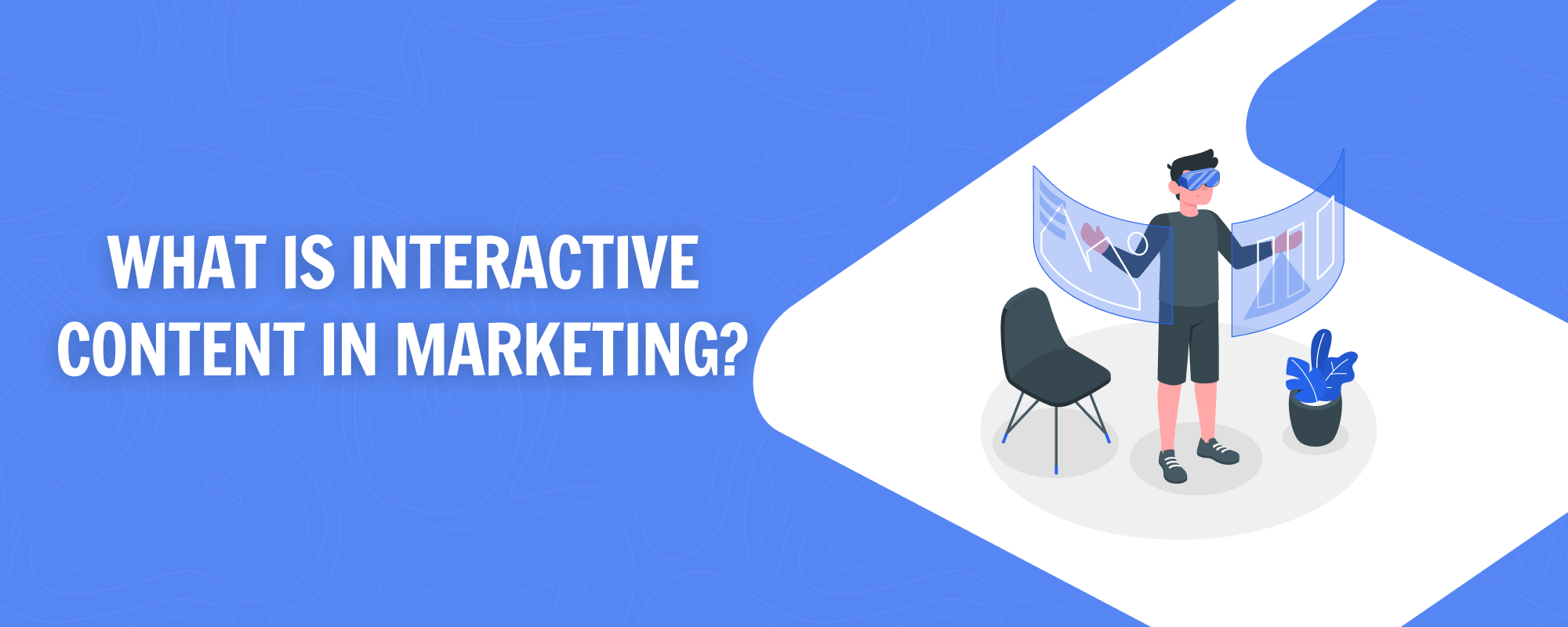Table of Contents
What is Interactive Content?
Consumers today expect to be a part of the brand experience, seeking more engaging and immersive interactive content over traditional static content.
Any type of content that is meant to engage the audience and make them active participants instead of passive consumers is referred to as interactive content.
They require an action from the user encouraging two-way communication. Imagine immersive videos that let you choose your own narrative.
So, interactive content does the following:
Why Is It Important for Marketing?
Content that tests your audience’s patience like long blogs with endless paragraphs and complex data thrown into a graph is no longer memorable.
On the other hand, simplified content that engages the audience is considered a win because you have succeeded in capturing their attention.
As you involve users, we get to know what they think of your brand, their opinions, and preferences. This can inform product development, content creation, and future marketing strategies.
Here’s how it benefits us:
Increased Brand Awareness
Unique and valuable content is shareable. It also improves your SEO by bringing organic traffic and attracting backlinks from reputed sites, press, and journals.
It also improves your SEO by bringing organic traffic and attracting backlinks from reputed sites, press, and journals. Not to mention you can use it as part of your advanced link building to build relationships with other websites and publications and secure valuable backlinks.
It encourages social sharing and helps you spread UGC, all the social proof you’d need.
Increased Qualified Leads
Interactive content is a result-driving lead magnet. By providing users with valuable information and an engaging experience, you can encourage them to share their contact information or take other desired actions.
At Milengo, we’ve seen firsthand how interactive content can drive qualified leads by providing value to users. For our website, we developed an interactive translation rate calculator to personalize user experiences by offering information that meets users’ unique needs. This not only builds trust but also enhances the lead generation process, turning interactions into meaningful conversions
Roman Kotzsch, CEO at Milengo
Some interactive elements like quizzes enable you to address the specific needs of your audience. This way your leads are more likely to buy your services.
Increased Conversion
It works as an effective conversion optimization strategy in attracting traffic to engage users throughout their buyer’s journey and speeding up the customer acquisition process.
Educate Buyers and Provide a Personalized Experience
Buyers are becoming deeply involved in the research and assessment stages of their buying journey. They want to be educated about your products and services which can make them more aware of their problems and needs.
Brand Visibility and Recall
”It’s the first thing I do when I wake up in the morning,” says a person who used the popular New York Times Game, Wordle. It has 4.8 billion users coming back to it every day.
The content that becomes a trend tends to stick in the audience’s mind, heightening the longevity of your relationship with the audience.
Brands can use data to personalize content and improve customer experience, making it more likely for them to revisit.
Moreover, interactive content attracts Gen Z who are far more challenging to appeal, due to their skeptical nature and seeking instant rewards.
Types - Interactive Content Ideas and Use
Quizzes and Assessments
This works well for capturing users’ interest in the top-of-the-funnel stage. It is a fun and informative way to learn about a topic, themselves, or what you offer.
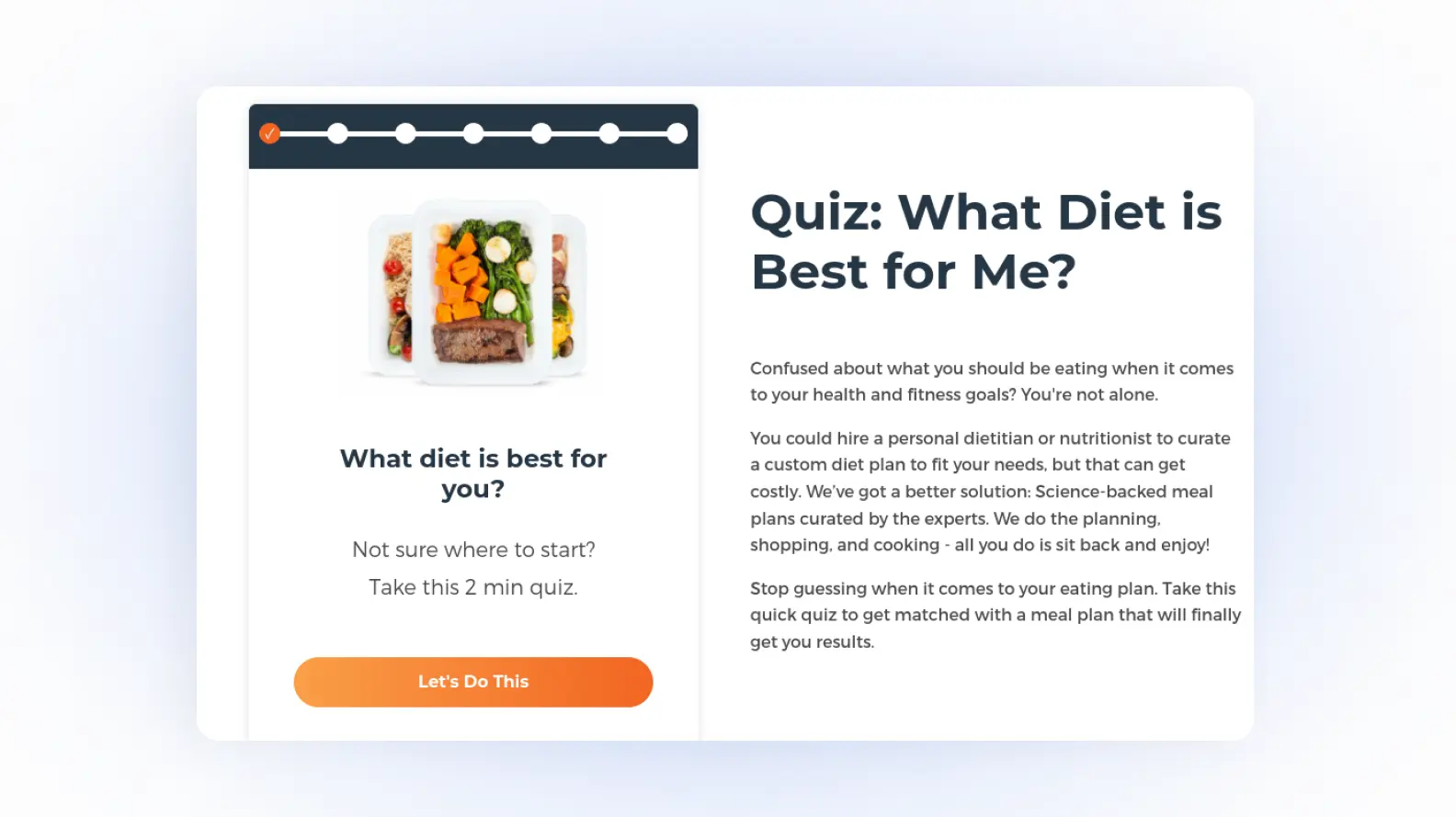
Surveys and Polls
Collecting feedback and opinions through these channels has become easier through online platforms. They can be embedded on websites, emails, distributed on social media, or shared through ads.
Interactive Games
Gamified content can give you the instant dopamine from winning or achieving something.
Think Spinwheels, puzzles, crosswords, and more.
Platforms like LinkedIn have implemented games to encourage more interaction with your peers. It is bound to become a ritual of your day and foster a sense of community.
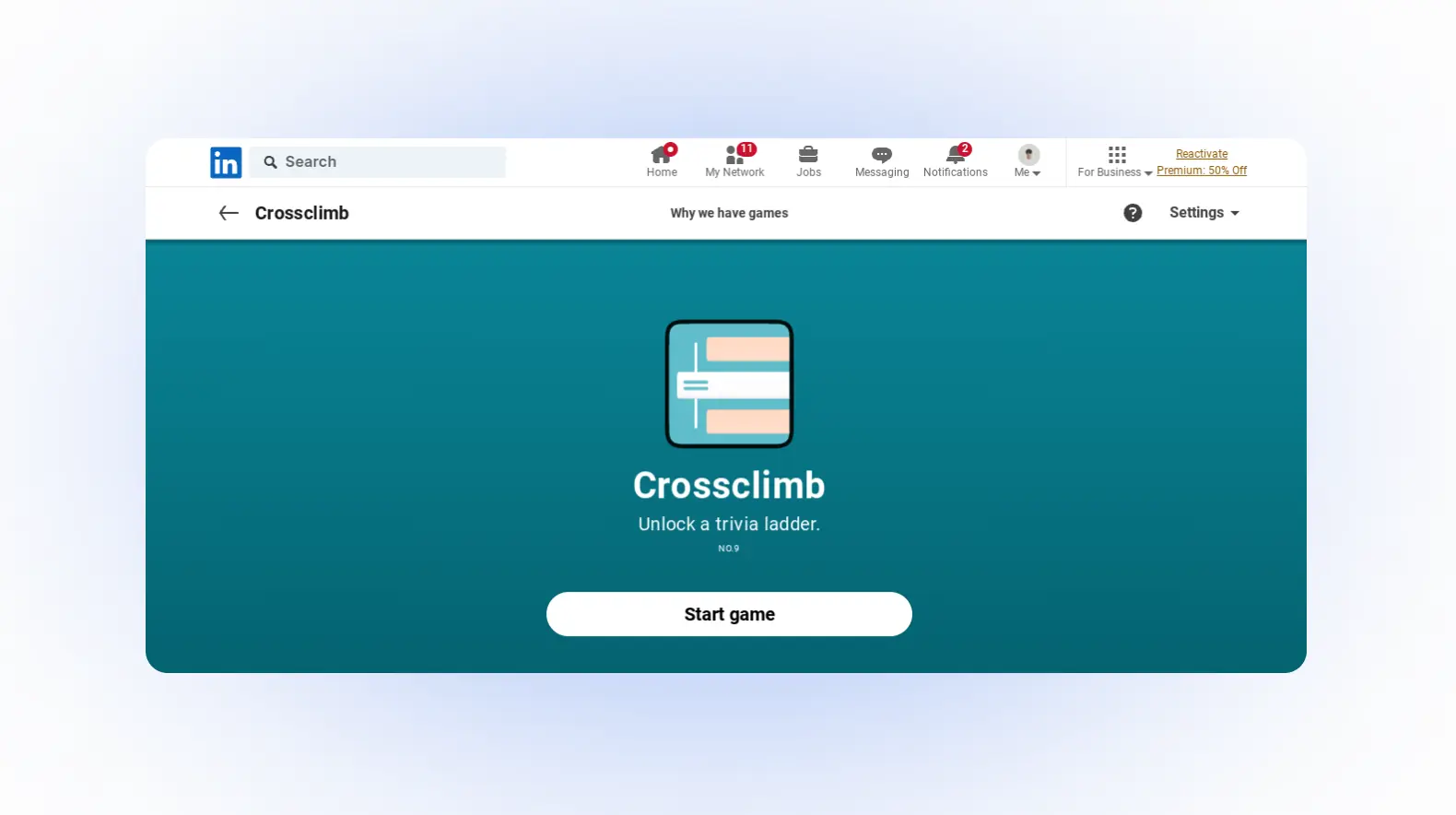
Popups
Popups are perfect for advertising flash sales, last-minute offers, and retaining a leaving customer. The bottom line is popups catch your audience’s attention.
Interactive Calculators
These tools give personalized results to help customers make informed decisions and feel good about their choices. It’s a win-win.
Interactive Ebooks and Infographics
Keeping readers engaged until the end is challenging, as long informational content can easily become monotonous. Interactive content helps make every page interesting, new, and unpredictable by throwing in different elements like graphs, quizzes, and images.
Breaking down complex information into easily recallable content is the breakthrough.
Interactive Images and Videos
If you have an image that could be supported by additional information, using hotspots to reveal them with a click is a smart solution. Additionally, you can add design elements like scratchcards, hover effects like tooltips, sliders, subtle animations, color shifts, and more.
360-degree videos provide an immersive experience similar to an in-store or on-site visit.

Interactive Maps
These interactive maps enable you to display additional information without needing to navigate the screen.
Interactive Catalogs, Flipbooks, and Product Configurators
These catalogs make it easy for customers to find their way and have a fun interactive shopping experience. E-commerce and retail stores often use configurators to allow customers to test their products and customize them as they like.
Interactive Product Demos
Interactive Product Demos are perfect for educating potential customers about a product’s functionalities. They allow users to engage with the product and experience its value in real-time.
It’s a bottom-of-the-funnel content type that personalizes user experience and increases the chances of buying. To quickly and effortlessly create product demos, use dedicated tools for that purpose such as Reprise or a Reprise alternative.
Interactive Advent Calendar
Advent calendars are digital calendars used for special occasions. You can embed a game, spin-wheel, surprise rewards, stories, videos, quizzes, and more for every date.
It’s a creative way to attract and engage your audience during the holiday season.
Flip Cards
Marketers use flip cards to reveal important information on landing pages, websites, and emails. They can test which CTA works well by tracking audience responses.
You can also gamify this to incentivize lead generation.
Online Treasure hunt
Initiate an engaging game allowing users to unlock new levels as they progress, encouraging audience participation and discovery.
Interactive Avatars
Interactive Avatars can provide real-time experiences for users, serving as virtual assistants or chatbots to enhance human interaction. The future of shopping involves the metaverse - a virtual landscape where you interact with digital stores as avatars.
Social Media Interactive Content
Contests and giveaways spread like wildfire as they come with an incentive, getting people to participate.
Quizzes, polls, surveys, interactive slides, and emoji reactions are quick and effective ways to collect opinions on your latest customizable clothing and gauge public awareness on a topic.
Strategy - For Beginners
Where to begin?
The answer is simple. You don’t have to begin by creating fantastic but expensive and time-consuming immersive experiences through AR and VR technology.
Instead, you can spend less time and resources in turning your existing content into engageable elements.
For example:
Turn long-form content into an interactive image slider.
How about an infographic with clickable hotspots?
The key is to know what suits your needs.
What are your goals?
Collect leads, engage and gather data, and nudge your audience towards conversion with visually compelling images, product configurators, and calculators.
Eventually interactive content does three things.
Ensure you provide value through your content.
What is your audience’s level of interest?
The level of interactivity may vary according to your goals and audience needs.
What is their level of interest?
Do they express interest in your offerings?
Are they aware of their problems?
Matching your audience’s pain points and needs to your goals can be crucial to forming the right kind of content for your interactive element.
Where to promote your interactive content?
Is it going live on your social media accounts like polls?
Is it embedded on your website landing page?
Is it going to be shared with your email audience?
Reach a wider audience through paid ads?
Planning a user’s journey from including entry and exit points to adding the right content is a challenging but essential task. Add it to your checklist.
How to collect leads and what type of data to collect?
Attaching a lead capture form before the user’s engagement is a smart way to gather user data.
Ensure you formulate the right questions and follow the rules in collecting user data.
How to track performance?
Use website analytics tools to measure user engagement, completion rates, time spent, and leads collected. Some platforms use heatmaps to identify areas where users spend most time hovering, clicking, or dropping off.
Analyze the data for improvement and refine your lead generation strategy when and where needed.
With this, follow an omnichannel strategy to ensure data flow and nurture your leads with timely communication.
Examples - Industry Specific
1. Calculators
Zillow’s mortgage calculator attracts 60K+ traffic to its webpage, aiding prospects to make an informed decision and eliminating the need to rely on external sources or grueling spreadsheets to make calculations.
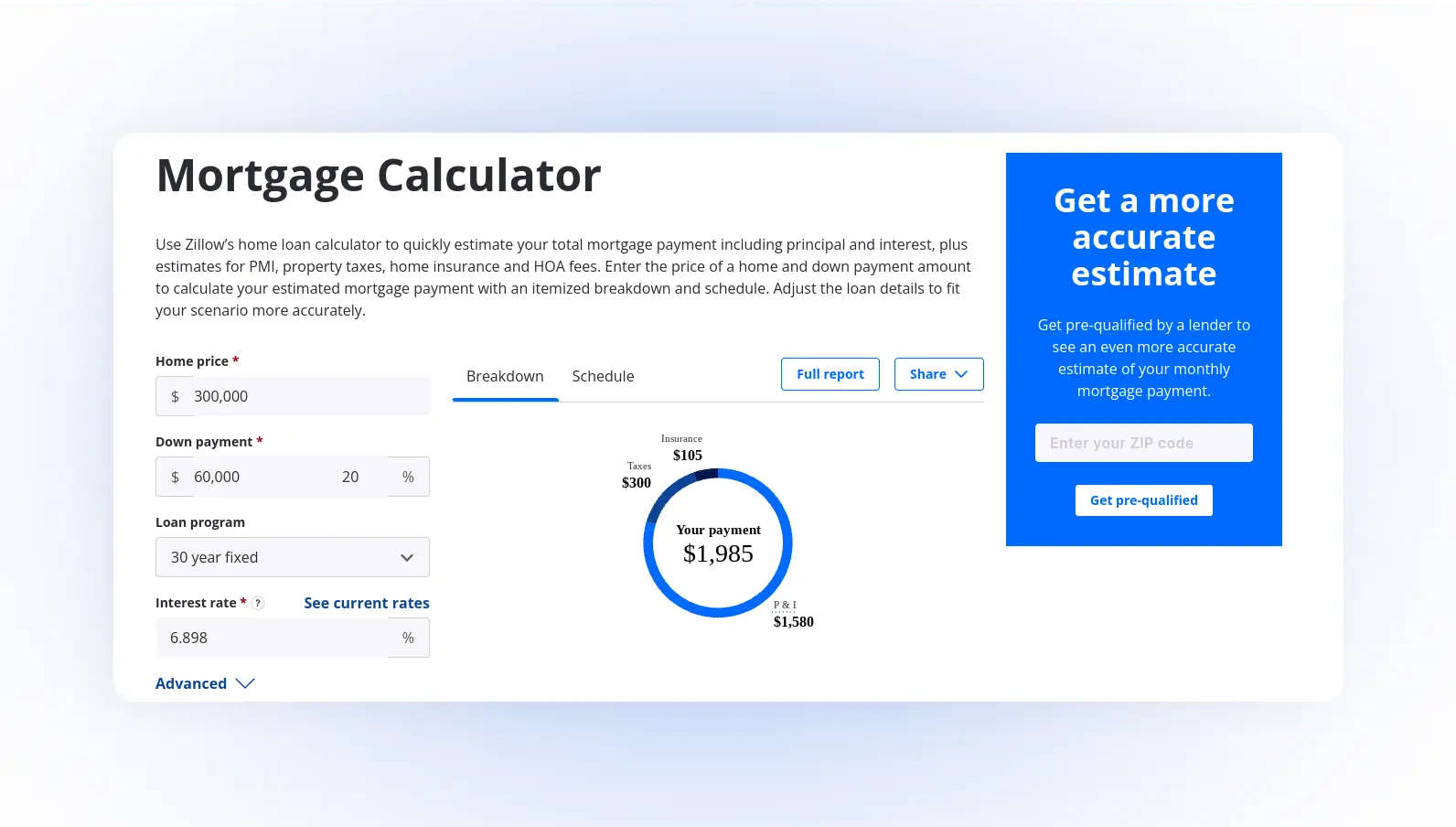
2. Quizzes
Any industry that offers customized solutions can use quizzes to understand their customer preferences.
Many businesses from the Wellness Industry use interactive quizzes to assess the level of their prospects and provide customized solutions tailored to their needs.
They attract prospects from ads with interactive quizzes and guide them toward the buying stage without much hassle.

3. Interactive Maps
This example from Zillow illustrates the benefits of interactive maps.
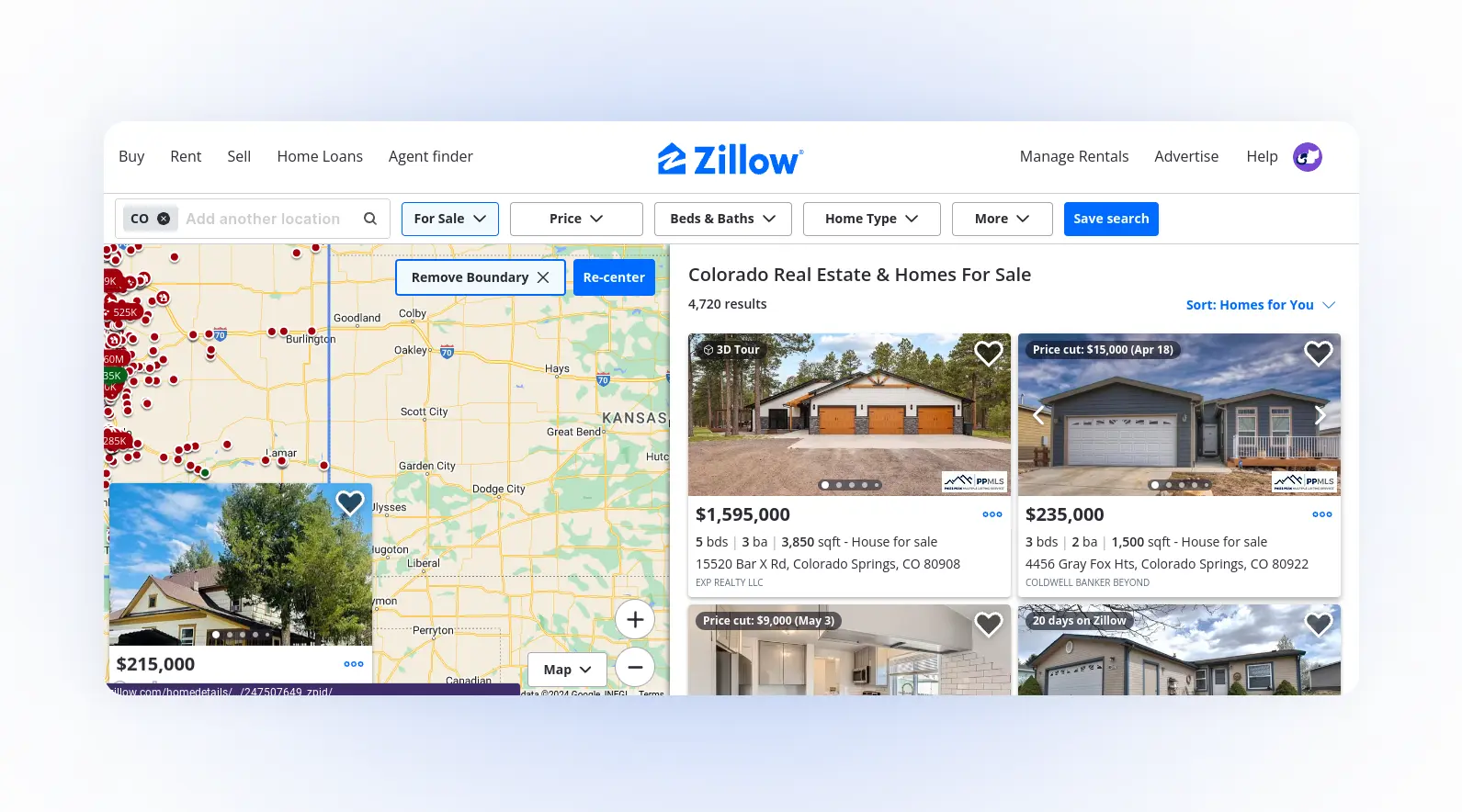
With one click, you’re able to discover the kind of homes you can afford in the right places.
4. Interactive Blogs
Our brains are wired to respond to moving images more than static ones. There is research supporting this claim and proving that they capture attention.
Take a look at this article from Vogue. This is a perfect way to make your static blog interactive with design elements. The scrolling effects give a break in the content for the reader’s convenience and to keep them going.
The infographics are presented with animated effects never failing to draw our attention.
The overall experience makes it fluid.
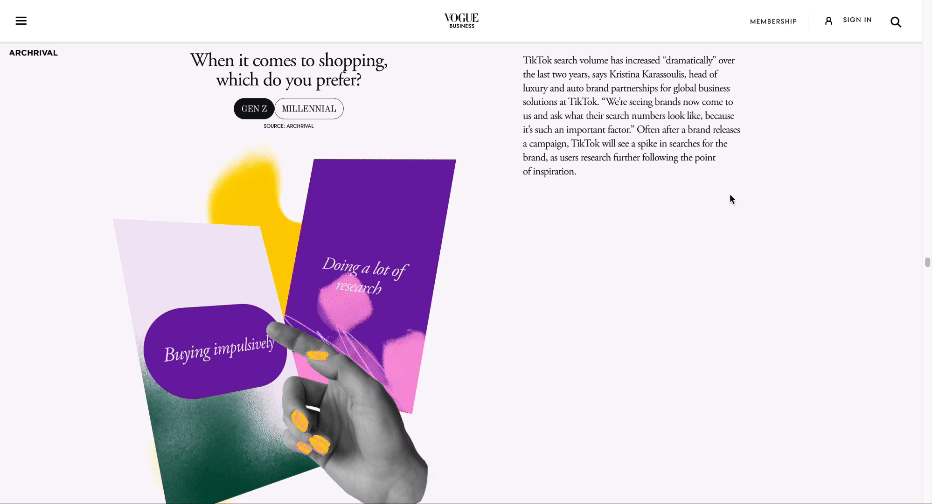
You can also add games, quizzes, surveys, and polls to make them more engaging.
Hurdles You May Come Across
Challenge: Making certain interactive content can be time-consuming. For complex elements, you may need a frontend, backend, and design team to achieve the level of interactivity you desire.
Solution: You can easily implement these on your website: quizzes, surveys, forms, polls, and calculators. They are value-focused and an optimal solution for your goals.
Using third-party platforms can be the quickest and most efficient way.
Challenge: Sometimes, interactive content may not achieve the results we expect.
Solution: In that case, identify the area of friction that has to be fixed and A/B test your content.
Platforms for Specific Needs
1. GoZen Engage - For Conversion-Focused Interactive Elements
GoZen Engage offers conversion-driving elements like interactive calculators, quizzes, surveys, and polls. It enables you to collect leads effortlessly through engaging games and puzzles.
It is a no-code tool with a drag-and-drop-builder that saves you a ton of time and is the most cost-efficient out there in the market.
2. Thinglink - To Create Interactive Images and Videos
Thinglink is a video and image-oriented tool, on a mission to make them interactive. You can create 360-degree videos and images, VR experiences, optimize your product pages with clickable hotspots with a CTA, and more product-related benefits.
3. Optinly - To Create Interactive Popups This no-code tool from GoZen helps turn static websites into an interactive lead collector and capture your customers’ interests with helpful notifications.
Our tool offers a wide array of templates with an easy-to-use interface that gets your work done in no time.
Conclusion
Reasons why you should use interactive content in your strategy:
Innovate your content marketing strategy with interactive media to adapt to the changing consumer trends and technology.
